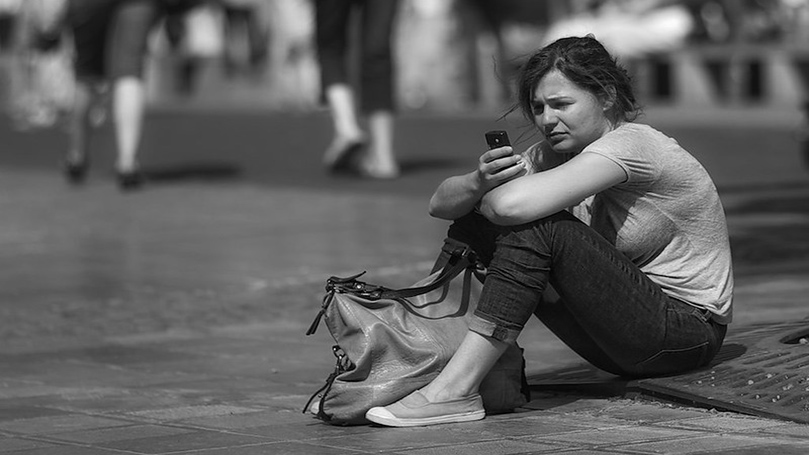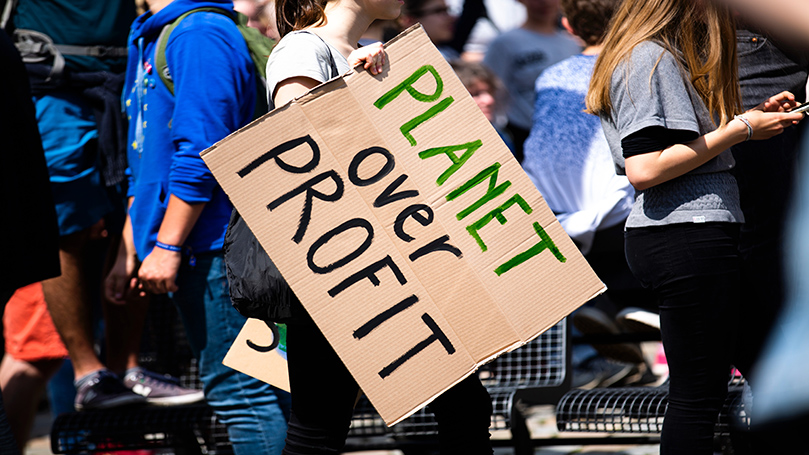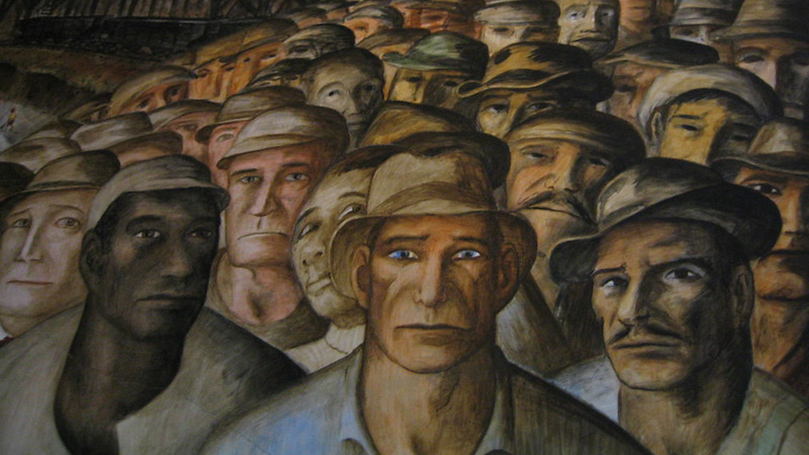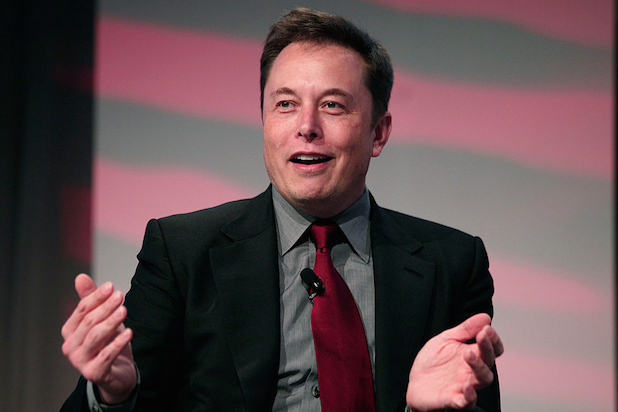BY:MICHAEL JAMES, PHD, LPC, LCADC, ACS| JULY 21, 2020

Remember life before COVID-19? Don’t be tempted to think those were the good ol’ days. Even before social distancing, were you feeling alone, depressed, and isolated? Feeling insignificant and purposeless? Our society was sick before COVID-19.
The latest issue of Rolling Stone magazine, carrying an article on the pandemic entitled “The Price of Isolation,” states, “America as a nation entered this pandemic particularly ill-equipped to handle it. For years, we have been engaged in . . . a ‘loneliness epidemic.’”[1] The Marxian term for this personal and political loneliness is alienation. Consider the varieties of alienation we suffer in capitalist society.
Alienation from One Another
Two dominant values in capitalist society are “rugged” individualism and competition. These are antisocial values. Lost are community and cooperation. Competition is fine on a soccer field, but workers in America, a society which does not share wealth, must compete for jobs, health care, and economic security. Such precariousness blocks worker solidarity and sparks racism, xenophobia, and sexism as workers fear job loss to the dreaded “other.” And America is now struggling to contain COVID-19 because many persons, asserting their individualistic freedoms, are resisting the need to wear a mask and socially distance. The antisocial capitalist ethos is “I” not “we.” It is simply un-American to subordinate individual freedom to collective need.

It is difficult to trust. We are guarded, defensive, and suspicious as we brace ourselves for the next hustle or swindle. The con job may come from the corporations or the person next door, but sometimes it seems as though everybody in capitalist society is on the make. Many cynically blame human nature, suggesting that people are naturally greedy, selfish, or predatory. Marx, as a materialist, affirmed human nature. He explained that consciousness does not determine life, but that life determines consciousness. The point is that the relations of production set the stage for human consciousness and human relations. The singular purpose of capitalism is to exploit. Therefore, exploitation characterizes human relations in this society. Marx brilliantly captured the depravity of capitalist relations, charging that the bourgeoisie “has left remaining no other nexus between man and man than naked self-interest, than callous ‘cash payment.’”[2] As writer Aldous Huxley confirmed, “Our present economic, social, and international arrangements are based, in large measure, upon organized lovelessness.”[3]
Indeed, it is the material conditions created by capitalism that prompts many to recite the cliché about seeing only two roles for themselves: victim or predator. The big fish swallows the small fish. Dog eats dog. Do unto others before they do unto you. Whichever cliché you dredge up, rest assured that it is capitalism that so perverts human relations in America.
Marx, however, gave due credit to capitalism: “Bourgeois society is the most developed and the most complex historic organization of production.”[4] But capitalist America is not an economic democracy. These tremendous productive forces benefit only a few. The late activist Kwame Ture (formerly Stokely Carmichael) said that there are only two possibilities for any society: the means of production are either privately owned or they are socially owned. In America, of course, only a few own and control the means of production. The result? The gap between rich and poor is wider than ever. Such a huge gap destroys community and adds greatly to social instability and alienation. Those who defend capitalism regard such monstrous inequality as a mere by-product of doing business. They heartlessly defend what Marx called “the most violent, mean and malignant passions of the human breast, the Furies of private interest.”[5]
Psychiatrist and author M. Scott Peck, in his book Community-Making and Peace, warns of the destructive power of inequality: “The great enemy of community is exclusivity.” “Humans hunger for genuine community,” he writes, and “through community lies the salvation of the world. Nothing is more important.” He promises that in true community “human differences are celebrated as gifts and alienation is transformed into reconciliation.” Dr. Peck adds, “It is only through community that we can achieve health and wholeness,” and “community is the cure for our greatest contemporary trouble.” Creating community is the only way “to live in understanding and peace with all the other peoples of the world.”[6] Dr. Peck, however, is an example of a learned scholar who is lost without Marx. He pretends that community is compatible with capitalism. Without socialism, his beloved community is simply a dream.

The latest gadgets created by the productive forces of capitalism can further erode community and contribute to alienation from one another. Products and innovations are introduced to create profit, with no regard for the social impact so that, according to Marx, “every new product represents a new potency of mutual swindling and mutual plundering.”[7] For example, now nearing extinction is the social act of leaving the house to visit the local movie theater: easier to stream movies at home. And in the past, if I saw you out and about, we could say “hello” and chat, while now one of us is quite likely to be on a smartphone. This little invention, while great if your car breaks down, wreaks havoc with human psychology in several ways. It promotes an inability to delay gratification, contributes to a breakdown of boundaries and privacy, adds stress by inviting people to multi-task, contributes to rudeness when pursuing private conversations in public places, promotes self-importance and ego, and destroys community by privatizing public space. Cell phones have even contributed to a new psychological disorder: constant partial attention (CPA).
Computers and the Internet likewise contribute to alienation by promoting human isolation, burdening us with useless information, and encouraging virtual rather than face-to-face interaction. The MTV music video, while no longer a cutting-edge development, was a significant step toward alienation. It has been said to be “the death of imagination.” Traditionally, when listening to a song, it was our freedom and responsibility to conjure up corresponding images, fantasies, or associations. Now the song and the visual imagery are presented together for our passive consumption.
Our declining community is addressed in a book with the intriguing title Bowling Alone,[8] which uses disappearing bowling leagues as one small measure of our alienation. Foreigners are often shocked to learn that many of us do not know our neighbors. And Airbnb is an example of entrepreneurship that has further eroded our sense of community. Even if you are fortunate or assertive enough to know your neighbor, you might wake up one morning to discover total strangers living next door. Suddenly, you are alienated from your own neighborhood. Even if the newcomers are friendly, the fact that your neighbor commodified a private dwelling has diminished your sense of belonging and community.
Uber is another capitalist innovation with social consequences. New York taxi drivers, after having invested huge sums for a cab and operating license, are distraught at the competition they face from Uber drivers. Some of them, facing bankruptcy and financial ruin, have committed suicide. Technology often improves quality of life, but the profit motive does not allow for consideration of the human and social impact. Marx was a political economist, but his description of the constant change that the search for profit brings to capitalist society reads like poetry: “All that is solid melts into air, all that is holy is profaned.”[9]
Persons of color, LGBTQ individuals, and immigrants are victims of bias and prejudice, useful tools of the capitalist class for preventing worker solidarity. Such persons are especially alienated in their inability to live freely, openly, and safely. And what of women, who hold up half the sky? A 2015 headline in the Huffington Post read: “The U.N. Sent 3 Foreign Women to the U.S. to Assess Gender Equality. They Were Horrified.” The three, from Poland, Costa Rica, and England, were human rights experts leading a United Nations study. They traveled across America, visiting schools, prisons, and even an abortion clinic in Alabama where they were harassed by two vigilantes protesting reproductive rights. The human rights experts described that particular scene as a “kind of terrorism.” While they “were shocked by many things they saw in the U.S., perhaps the biggest surprise of their trip . . . was learning that women in the country don’t seem to know what they’re missing.”[10] U.S. women—having bought into bourgeois ideology, education, and culture—are alienated from basic awareness of their rights to gender equality, equal pay, paid maternity leave, affordable child care, and reproductive freedom.
The ways that we are estranged from our comrades are numerous. Our social, communal, cooperative, and collective nature is thwarted and frustrated. Capitalism denies human beings comradeship, belonging, and true community. American poet Walt Whitman wrote of the “need of comrades,” and psychologist Abraham Maslow, in his Hierarchy of Human Needs, confirmed this need. The first level of human need is physiological: food, water, sleep, and elimination. The second level of need is for safety and security. And what comes next, after these very material needs? Belonging! And, according to Maslow, where do most Americans stall out as they strive to actualize or develop? Belonging! Maslow made it clear that most of us, because of our competitive, individualistic, antisocial, alienated society, never realize our need to belong.[11] Marx, as always, said it best when he described our greatest wealth as “the other person.”[12]
Alienation from Nature
Another key value associated with capitalism is dominance over nature. Respectful coexistence is lost. Reverence and respect for nature are virtues smashed beneath capitalism’s insatiable demand for development, expansion, appropriation, and profit. Nature becomes a mere commodity for corporations and individuals to have, to consume, to degrade, and to defile. Pollution is simply good business. Marx saw that “the mode of perceiving nature, under the rule of private property and money, is a real contempt for, and a practical degradation of, nature.” Thomas Münzer, whom Marx quoted, declared it intolerable “that every creature should be transformed into property—the fishes in the water, the birds of the air, the plants of the earth: the creature too should become free.”[13]

Environmentalist and writer Edward Abbey famously noted that “growth for the sake of growth is the ideology of the cancer cell”[14] Yet, how many of us grieve about the malignant development and sprawl that has transformed our once charming, green, unique communities into garish, impersonal, commercial eyesores? Scientific evidence regarding climate change and global extinction of species is overwhelmingly abundant—and alarming. Capitalism has clearly brought us to the brink of ecological apocalypse. Preventing the demise of the human race and other species will require a concerted global effort which transcends nationalism. But we have a criminal U.S. president who is ignorant, arrogant, unread, and slavishly devoted to crony capitalism, deregulated corporate anarchy, and his own personal enrichment. He has gutted EPA regulations, scoffed at international climate change treaties, and championed a militant, reactionary, narcissistic nationalism with the suicidal war cry “Make America great again.”
Climate change activist Greta Thunberg speaks with passion, courage, and a justified moral outrage. However, she and all environmentalists need to acknowledge that, to save the planet, they must become abolitionists devoted to smashing capitalism and nationalism. Thomas Piketty’s Capital and Ideology says it well: “It seems obvious that the only way to transcend capitalism and ownership society is to work out some way of transcending the nation-state. We’ll need ‘a true participatory and internationalist socialism’ in order to free humanity.”[15] Regarding nationalism, Marx urged workers “of all countries” to unite while declaring beautifully and simply: Workers “have no country.”[16]
One aspect of alienation from nature is simply being out of touch. Many of us are so stressed or overworked that we are numb to natural beauty. Technology plays a role in distancing us from nature. Psychotherapists have observed a “loss of wonder” in children as they become more absorbed in computers, TV, and smartphones and less observant of the natural world. It is heartbreaking to contemplate children and adults who no longer experience a sense of wonder at the song of a bird, the complexity of a spider web, the shape of a cloud, or the color of a flower. Native American Crowfoot offered an indigenous view: “Life is the flash of a firefly in the night, It is the breath of a buffalo in the wintertime.”[17]
Alienation from Labor and the Wealth Created by Labor
We are even alienated from our work. Marx knew that our labor is an expression of our essence. Our labor is sacred, a profound and fundamental manifestation of our energy, ideas, strength, and creativity. Capitalism defiles and perverts work. Our intellectual and physical labor is commodified when we sell it to a buyer in the job market. Many people despise and dread their jobs and are made physically or mentally sick by them. The diagnostic manual of the American Psychiatric Association includes a “malingering” diagnosis, which is when a worker feigns illness to elude work.
Small wonder. In this society, most of us are alienated from our labor activity and from the product of that intellectual or physical labor. Our productive activity is not our own, the product created is not our own, and the wealth generated is not our own. We are thereby alienated from our own sweat. Your labor is an expression of you, of your deepest and truest self, but Marx saw that in capitalist society “the worker’s activity . . . belongs to another; it is the loss of his self.”[18] Labor creates all wealth. But when your labor belongs to another, you are left with nothing. You are nothing. Therefore, Marx urged workers to exclaim, “I am nothing and I should be everything.”[19]

Capitalism is a system designed to steal. The theft is so grand that it is breathtaking. In America, it began with the genocide of Native American peoples, a holocaust with an estimated 50 million dead.[20] The historic theft continued with the capture, enslavement, and selling of Africans. The attempts to measure the enormity of this theft reveal the rabid nature of US capitalism: “In 1860, over $3 billion was the value assigned to the physical bodies of enslaved Black Americans to be used as free labor,” and “in 1861, the value placed on cotton produced by enslaved Blacks was $250 million.”[21] A 2019 estimate of the total reparations due to African Americans comes to $17.1 trillion.[22]
The theft of wealth created by working people marches on today with an assault on US and foreign labor headed by multinational corporations and euphemistically known as “globalization.” Marx perfectly described the imperialism of US foreign policy: “The need of a constantly expanding market for its products chases the bourgeoisie over the whole surface of the globe,” and capitalism “compels all nations, on pain of extinction, to adopt the bourgeois mode of production, it compels them to introduce what it calls civilization into their midst, i.e., to become bourgeois themselves. In one word, it creates a world after its own image.”[23]
Alienation from Class Identity
Capitalism steals materially, through private control over the means of production and by appropriation of the wealth produced by labor, and it steals ideologically, through bourgeois popular culture, education, and corporate news and entertainment. Marx taught us that
the ideas of the ruling class are in every epoch the ruling ideas: i.e., the class which is the ruling material force of society, is at the same time its ruling intellectual force. The class which has the means of material production at its disposal, has control at the same time over the means of mental production.[24]
The latest estimate is that all of our news and entertainment comes from about six major corporations. Consider the chilling implications: as a worker, you are led into false consciousness and mental slavery whenever you turn on the TV, pick up a newspaper, or see a Hollywood movie. As the great Malcolm X said, “They put your mind in a bag and take it wherever they want.”[25]
US working-class history is ignored and erased. May Day, for example, is recognized around the world as the holiday of the working class. What does America have? A contrived Labor Day handed to American workers like a scrap of food tossed to an obedient dog. And every day in schools our children are assaulted with a “hidden curriculum,”[26] which presents capitalist ideology as legitimate, natural, and superior. In other words, education is part of a superstructure of culture and politics which arises from an economic base to lend legitimacy to capitalism. The ideas of America’s corporate ruling class “spread everywhere, in every nook and cranny.”[27] Educator Paulo Freire’s famous Pedagogy of the Oppressed confirmed that “there is no such thing as a neutral educational process.”[28] Education either integrates students into the present system or inspires them toward transformation and revolution.
And so, in our schools there is no working-class pedagogy. The significance of class and the class struggle is minimized, downplayed, and ignored. The truth, however, is that class is our most defining characteristic, more so than race, gender, ethnicity, religious affiliation, or sexual orientation. This is so because we are material creatures. As Frederick Engels said at Marx’s funeral:
Just as Darwin discovered the law of development of organic nature, so Marx discovered the law of development of human history; the simple fact, hitherto concealed by an overgrowth of ideology, that mankind must first of all eat, drink, have shelter and clothing, before it can pursue politics, science, art, religion, etc.[29]
Therefore, class consciousness is necessary for a genuine or authentic personal identity. But millions of American workers, black and white, male and female, gay and straight, young and old, intellectual and physical toiler, have false consciousness: they simply do not know who they are, do not understand their true worth, do not realize that they create all wealth, and, perhaps most tragically, do not embrace socialism as the only alternative to their exploited, degraded, and precarious condition in capitalist society.
Capitalism steals everything from the working class: our labor, our wealth, and our class-conscious identity. If you don’t know who you are, you cannot properly defend yourself. You will settle for reforms. This alienation is thorough and total. It is a loss of the authentic, class-conscious self, what Marx called “self-estrangement” or “self-alienation.”[30] The remedy is communism or socialism, which Marx defined as simply the “transcendence of human self-alienation.”[31]
Alienation from Our Historic Purpose
Does the working class exist simply to produce wealth for the bourgeoisie, to fight ruling-class wars, and to be mystified by corporate news and entertainment, forever enslaved by false consciousness? Does the working class exist to scratch and claw for mere reforms? Is it the fate of the working class to suffer and die in a climate-changed ecological catastrophe created by corporate polluters? The answers are “no.”
Marx saw that capitalism could be the last “antagonistic” period in which society is divided by conflicting and irreconcilable class interests. He therefore assigned one task to his esteemed working class: revolution! Our sacred duty is to be abolitionists. We must abolish class distinctions and the profit motive and private control over production and distribution. We must produce and distribute socially. We must establish economic democracy. Marx and Engels, in the Manifesto, called us to action: “Let the ruling classes tremble at a Communistic revolution. The Proletarians have nothing to lose but their chains. They have a world to win.”[32]
COVID-19 has dragged us down to the second level of Maslow’s hierarchy: the need for safety and security. And even though we are still dealing with the immediate and deadly consequences of the virus, it is certain the long-term impact will be to further our alienation. The capitalist class is sure to use the virus to tighten its grip on production, intensify its war on labor, and further impoverish and degrade the working class. So we must be ever mindful of our historic task to overcome alienation and to build socialist society.
Notes
[1] Alex Morris, “The Price of Isolation,” Rolling Stone, July 2020, p. 63.
[2] Marx and Engels, Communist Manifesto, 1848.
[3] Aldous Huxley, The Perennial Philosophy.
[4] Marx, Grundrisse.
[5] Marx, Preface to Capital, vol. 1.
[6] M. Scott Peck, The Different Drum: Community-Making and Peace, Simon & Schuster, 1987.
[7] Marx, Economic and Philosophical Manuscripts of 1844.
[8] Robert D. Putnam, Bowling Alone: The Collapse and Revival of American Community, revised and updated, Simon & Schuster, 2020.
[9] Marx and Engels, Communist Manifesto, 1848.
[10] Laura Bassett, “The U.N. Sent 3 Foreign Women to the U.S. to Assess Gender Equality. They Were Horrified.” Huffington Post, September 22, 2015.
[11] B. R. Hergenhahn, An Introduction to Theories of Personality. Englewood Cliffs, NJ: Prentice-Hall, 1984.
[12] Erich Fromm, Marx’s Concept of Man. New York: Continuum, 1992, p. v.
[13] Marx, On the Jewish Question, 1844.
[14] Edward Abbey, The Journey Home: Some Words in the Defense of the American West. New York: Plume, 1977.
[15] Thomas Piketty, Capital and Ideology. Cambridge, MA: Harvard University Press, 2020.
[16] Marx and Engels, Communist Manifesto, 1848.
[17] Hyemeyohsts Storm, Seven Arrows. New York: Ballantine Books, p. 67.
[18] Marx, “Estranged Labour.” In Economic and Philosophical Manuscripts of 1844.
[19] Marx, A Contribution to the Critique of Hegel’s Philosophy of Right, 1844.
[20] Steve Charleston, Victims of an American Holocaust. Washington, DC: Sojourners, 1992.
[21] Rashawn Ray and Andre M. Perry, “Why We Need Reparations for Black Americans.” Brookings, April 15, 2020.
[22] Kristin Myers, “Slavery Reparations Could Carry a $17 Trillion Price Tag,” Yahoo Finance, June 28, 2019.
[23] Marx and Engels, Communist Manifesto, 1844.
[24] Marx, The Germany Ideology, 1846.
[25] Malcolm X, February 1965: The Final Speeches, edited by Steve Clark. New York: Pathfinder Press, 1992, p. 154.
[26] Edward Stevens, George Wood, and James Sheehan, Justice, Ideology, and Education. New York: McGraw-Hill, 1992, p. 112.
[27] Geoffrey Partington, “The Concept of Progress in Marxist Educational Theories.” Comparative Education 24, no. 1 (1988), p. 84.
[28] Paulo Freire, Pedagogy of the Oppressed, 1995, p. 16.
[29] Fromm, Marx’s Concept of Man, p. 258.
[30] Marx, “Estranged Labour.” In Economic and Philosophical Manuscripts of 1844.
[31] Introduction, The Marx-Engels Reader, 2nd ed., edited by Robert C. Tucker. New York: W.W. Norton, 1978, p. xxv.
[32] Marx and Engels, Communist Manifesto, 1848.
Further Reading: see Karl Marx, “Estranged Labour,” in Economic and Philosophic Manuscripts of 1844.
Cover image: Scott Loftesness, Creative Commons (BY-NC-SA 2.0).
Images: Sitting apart, Ding Yuin Shan, Creative Commons (BY 2.0); Woman on cell phone, Fouquier, Creative Commons (BY-NC 2.0); Planet before Profit, Markus Spicke, Pexels; Workers mural, photo by Ari Evergreen, Creative Commons (BY-NC-SA 2.0).





